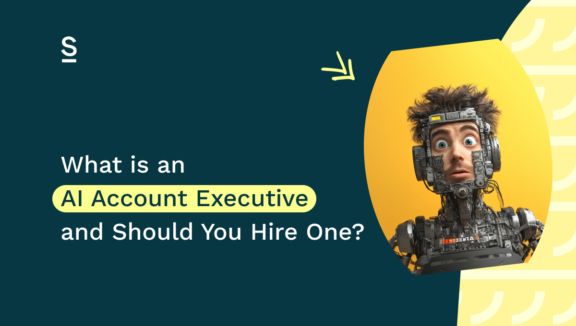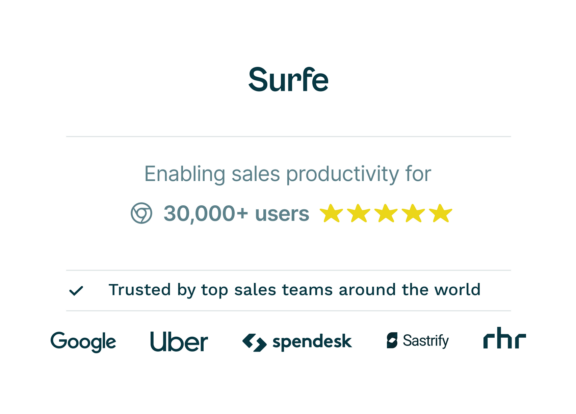What is an AI Account Executive (AE) and Should You Hire One?

AI account executives: friend or foe?
If you answered the latter, we wouldn’t blame you: AI’s (obviously) a hot topic in the world of B2B sales at the moment, and not always for positive reasons. Yes, it’s transformed the industry and made us more efficient and productive by taking away routine tasks, but 14% of workers also experienced job displacement due to AI in 2024.
When a tool as game changing as AI comes out there’s naturally going to be a bit of a market shift, and this rightly caused some concern in the sales world about the future of our jobs. It makes sense, then, that you might be overly cautious around the topic of AI account executives – or wondering whether account executive AIs can truly match human performance. Today, we’re going to address the elephant in the room and talk about it: should AI replace human AEs, or should it assist them?
Want to skip ahead? Here’s what we’re going to cover:
- What is an AI Account Executive?
- What Can an AI AE Do Well?
- Where AI Falls Short in Sales
- Why You Shouldn’t Replace AEs With AI – But Enhance Them Instead
- How to Enable Your AEs With AI Tools
By the time you’ve finished reading, you’ll understand exactly what an AI account executive does, what they’re good at, and where they fall short. You should (spoiler alert) also feel more comfortable about them – we’re firmly convinced that AI account executives make excellent assistants, but aren’t sufficient enough to replace humans.
Let’s get started.
What is an AI Account Executive?
An AI account executive is an AI-powered system that automates parts of the sales process. They’re great at:
- Identifying companies that are likely to buy (thanks to being able to track AI-driven intent signals)
- Prioritizing leads based on data analysis
- Automating personalized outreach at scale
- Handling repetitive tasks like follow-ups and CRM updates
So far they sound pretty helpful. Sales reps spend 70% of their time on non-selling tasks – and if AI account executives can take a lot of that off their hands, what’s not to love?
What Can an AI AE Do Well?
So, why are AI account executives so good at the above tasks? Let’s take a closer look at their talents – and where they (gulp) outstrip human capabilities.
Data Processing and Insights
AI can analyze vast amounts of data to find patterns and predict sales opportunities. At the end of the day, there’s only so much data a human can work through in one day. AI AEs have no such limitations, which makes them far more likely to notice a pattern that a human might not pick up on – and opening up a new opportunity for you in the process.
Lead Qualification
All this data processing also makes AI account executives really, really good at ranking and prioritizing leads based on engagement and buying signals. When you’re working at scale, it’s impossible to keep track of every little engagement and buying signal manually – but you can easily use AI for this AE task, and then use their learnings to tell you the order in which you should go after these leads. Magic.
Personalize Outreach at Scale
We all know personalized is the only way to get a prospect’s attention – but sending a totally unique message that speaks to their exact pain point is a different story when you’ve got tens or even hundreds of people to reach out to. AI account executives solve this problem by generating tailored emails, messages, and responses quickly. With account executive AIs, sales teams can scale personalized outreach while ensuring each message stays relevant – all you have to do is give them a quick once-over to make sure they’re hitting the mark.
Task Automation
Next up, think about all those little tasks that don’t take much time individually but add up over the course of a day or a week. You know, things like scheduling meetings, logging CRM data, following up on cold leads, and so on and so forth. AI agents save you time by scooping all of these up – and protect your brain power too, by minimizing the amount of times you have to context switch.
Where AI Falls Short in Sales
So far, AI account executives sound pretty amazing, right? Right – but there’s a reason they haven’t put us all out of a job yet. Let’s take a look at some of the places they’re not so good.
Lack of Human Connection
We’re sure this is going to come as a colossal shock, but AI can’t build genuine relationships or navigate complex negotiations. Imagine the most complicated, specific question a lead has ever asked you. Now imagine giving it to AI to answer. See what we mean?
Limited Adaptability
AI follows algorithms but struggles with nuanced decision-making. In other words – it’ll excel at simple, repetitive, high-volume tasks, but anything that requires a bit of differentiation will be a different story.
Trust and Credibility Issues
Buyers might be happy to ask a website bot a quick question, sure, but for a decision worth tens or even hundreds of thousands, they’re going to want to speak to a human. A recent study revealed that B2B customers are significantly more emotionally connected to their vendors than consumers. Now, can you really imagine a buyer making an emotional connection with an AI account executive? No, us neither.
Over-Reliance on AI Risks Missing Opportunities
AI isn’t perfect – it makes mistakes just like the rest of us. Totally rely on your AI account executive, and you might find that it misinterprets a signal or fails to identify a non-obvious prospect. You really, really don’t want this to happen with a high-value lead, which is why it’s key to maintain human oversight in your processes.
Why You Shouldn’t Replace AEs With AI – But Enhance Them Instead
Now, we’re pretty clear on our thinking about AI account executives. They’re amazing co-pilots or assistants, but they absolutely should not be a replacement for humans. Sure, they’re incredibly efficient and productive, but they can’t replace human intuition and relationship building.
Instead of reducing an AE team from 10 to 2, you’d be far better off keeping your team of 10 and making them even better with AI AE support.
Think about it this way:
- Use an AI account executive, and you can find better leads faster
- Use an AI account executive, and you can speed up research so your human AEs can focus on selling
- Use an AI account executive, and you can make sure your outreach gets to a prospect before your competitors do
How to Enable Your AEs With AI Tools
So, now you’re (hopefully) on the same page as us – how do you actually go about enabling your AEs with AI tools?
We’d recommend covering the following areas:
-
- Lead scoring & intent signals: you already know that AI can help you identify high-potential buyers faster. If you’re on the lookout for a tool to help, you’re in the right place 😎Surfe’s AI Agents will look out for highly qualified accounts and notify you when they make specific buying signals, so you can always find prospects that are ready to buy right this moment. For example, you could set up an AI Agent to let you know about businesses that have recently closed funding rounds or are advertising for a new role.
- Personalization at scale: the best outreach tools will use AI to personalize messages based on prospect data – without you having to compromise on scale or time spent crafting.
- CRM automation: there’s a lot of admin that goes into maintaining a CRM (and water is wet, we know). AI can pick up a lot of it, leaving AEs to do the important stuff like selling.
Sales forecasting: put AI’s data analysis skills to good use here. Your tool should be able to analyze historical data to predict what’s going to happen in the near future – your AEs can then make decisions off the back of these learnings.
Let’s Wrap It Up: AI is a Tool, Not a Replacement
At the end of the day, AI is a wonderful tool. When used properly, it can improve sales performance; making your team more efficient and more productive. What it can’t do is replicate human relationships and strategic thinking – leave that side of things to your current AE team, empower them with AI where necessary, and you’ll be onto a winner.

Interested in some AI AE support?
We bet you are – hit the button below for the best AE help out there (if we do say so ourselves).
FAQs About AI Account Executives
What Is an AI Account Executive?
An AI Account Executive (AE) is an AI-powered system designed to automate parts of the sales process. It helps sales teams by identifying high-potential leads, prioritizing outreach, and automating repetitive tasks like CRM updates and follow-ups. AI AEs can also analyze vast amounts of data to spot patterns, predict buying behavior, and personalize outreach at scale. While they can significantly boost efficiency, it’s important to note that they lack human intuition and relationship-building skills – so they work best as co-pilots rather than replacements for human team members.
How Can an AI AE Improve Sales Efficiency?
AI AEs shine when it comes to speeding up research, lead qualification, and task automation. Sales reps spend up to 70% of their time on non-selling activities – AI AEs reduce this by handling admin-heavy tasks like logging data, tracking engagement signals, and personalizing outreach. They also help identify the most promising leads faster, which helps reps make sure they’re focusing their efforts on high-value prospects. This means sales teams can engage buyers at the right moment, increase response rates, and spend more time on what they do best (that’s the actual selling part, in case you didn’t know).
Can AI AEs Replace Human Sales Reps?
No, AI AEs can’t replace human sales reps – and they shouldn’t. While AI is excellent at processing data and automating routine tasks, it lacks emotional intelligence, adaptability, and the ability to build trust with prospects. Buyers making big purchasing decisions want to speak to real people, not robots. AI also struggles with nuanced decision-making, meaning a purely AI-driven approach risks missing key opportunities. The best approach is to use AI AEs to handle repetitive tasks and provide insights, while human reps focus on relationship-building and closing deals.
What Are the Limitations of an AI Account Executive?
Despite their strengths, AI AEs have some clear limitations. They can’t form genuine connections, navigate complex negotiations, or handle unexpected buyer objections. AI operates within pre-set rules, so it struggles with nuanced decision-making or creative problem-solving. Trust is also a factor. B2B buyers are more emotionally invested in their vendors than consumers, making it unlikely that they would rely entirely on AI for major purchasing decisions. Over-reliance on AI also risks missing out on high-value leads if the system misinterprets signals. That’s why human oversight remains crucial.
How Should You Use AI AEs to Support Your Sales Team?
The best way to use AI AEs is as an enhancement – not a replacement – for human reps. AI can identify high-value leads, automate outreach, and streamline CRM tasks, allowing sales teams to focus on closing deals. Companies should implement AI tools that assist with lead scoring, personalization, and sales forecasting while making sure human reps remain in control of relationship-building and strategic decision-making.


